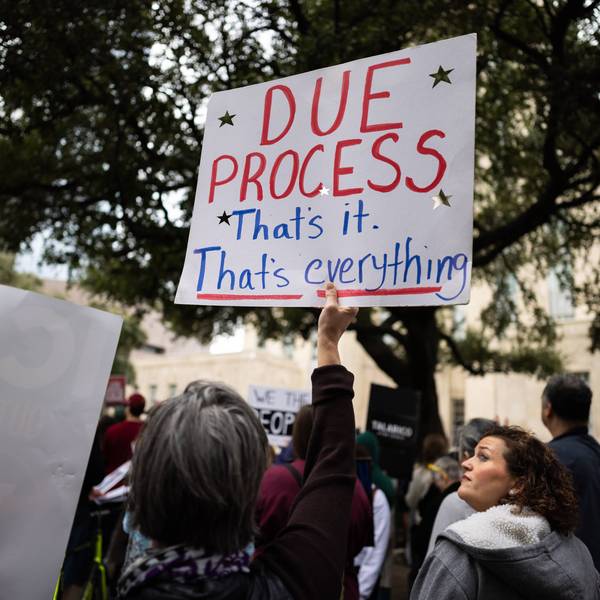Whenever U.S. Immigration and Customs Enforcement insists it is just doing its job, Americans should take a closer look at what is happening.
With an executive order signed in his first week in office, President Trump has "taken the shackles off" ICE and Border Patrol officers, according to the White House, expanding the priorities for deporting immigrants. Homeland Security Secretary John Kelly claims his agents will focus on those convicted of or charged with crimes, but immigrant advocacy groups and the news media already have documented arrests, detentions and deportations of immigrants who in no way represent a threat to public safety.
From 2006 through early 2010, I reported on Immigration and Customs Enforcement. What I learned was that no matter the ostensible priorities of federal agencies -- or even settled law -- ICE was an agency prone to overreach.
In those days, immigration agents liked to roll out press releases touting the successes of their "fugitive operations." The releases detailed how violent gang members, sexual predators and other criminals were taken off the streets. Time and again, I pressed the agency for detailed information on those arrested only to discover the detainees were neither fugitives nor serious criminals.
Some people will shrug and say that if you're in this country illegally you should be...sent packing. But enforcement is always a matter of priorities.
Instead, I found longtime green card holders who had been convicted decades earlier of minor offenses. Or who were ordered deported in absentia, in some cases because they had moved or the wrong paperwork had been filed. Among the detainees without green cards, many simply didn't come close to fitting the description "danger to society." They were street vendors, construction workers, janitors and small business owners, albeit without papers.
Enforcement efforts outside the fugitive program had problems as well.
One case I reported on involved a U.S. citizen who had once before been wrongly deported to Mexico. When I met him, he was a candidate for deportation after he'd been convicted of drug possession. Again and again he told ICE he was an American, born in California's Madera County. His family produced a birth certificate, but neither the agents nor the immigration judge were convinced. Instead he was threatened with an added charge: impersonating a U.S. citizen. It took publishing a newspaper story about his plight to gain his release.
In another case, agents attempted to deport a Senegalese man who had a legal stay from a federal court allowing him to remain in the U.S. while his case was adjudicated. ICE dealt with him under a covert program that forcibly drugged immigrants with powerful psychotropics so they wouldn't resist as they were loaded onto commercial airliners for the trip "home." At LAX, airline officials refused to transport him. He eventually succeeded in court and is now a legal permanent resident.
Victoria Arellano, a 23-year-old HIV-positive transgender woman, was stopped at a DUI checkpoint and eventually turned over to ICE. She was held in a federal detention center and denied the life-saving drugs she took daily despite clear case law that says denial of care is unconstitutional. When Arellano died, she was bound to a hospital bed even though she was too weak to raise her arms to hug her mother, who had feared visiting her daughter because of her own immigration status.
ICE also detained green card holders with mental illnesses and sent them to a network of private hospitals where they were illegally held incommunicado. Once they were deemed stable -- in the cases I covered, such judgments were questionable -- they had to appear in immigration court, often without representation despite laws that require the state to provide the mentally disabled with legal help. One such green card holder was detained because of a domestic violence conviction. I spoke to him shortly before his hearing. He couldn't focus, he told me, because of the voices in his head. Days later, his mother called sobbing. Her son had been deported to Mexico, a country he barely knew and where no one could take care of him.
I found another case in Haiti. David Gerbier, a green card holder with two U.S. citizen children, was deported to the Haitian capital, Port-au-Prince, in 1999 after an immigration court illegally bumped up a minor drug charge to an aggravated felony. A federal appeals court ruled that Gerbier's offense was indeed a misdemeanor and tossed out his deportation order. Nonetheless, U.S. officials in Port-au-Prince repeatedly denied Gerbier reentry into the United States. It took 10 years and a pro bono lawsuit before he was finally reunited with his family.
Given ICE's disturbing track record for ignoring legal limits, the excesses we're hearing about now shouldn't come as a surprise. There's the young man in Washington state with Deferred Action for Childhood Arrivals status. He was rousted from bed and accused of being a deportable gang member. His lawyers say the charge is only supported by doctored documents. On Wednesday, federal agents removed a Salvadoran woman, reportedly scheduled for emergency brain surgery, from a Texas hospital bed.
Some people will shrug and say that if you're in this country illegally you should be detained and sent packing. But enforcement is always a matter of priorities. The Trump deportation guidelines are extreme in their scope compared with the priorities set as far back as the late 1990s. And anyone on U.S. soil -- citizen or not -- ought to be entitled to due process. The president says he will keep our country safe. ICE appears to have decided that when it cannot find serious criminals, it will protect us from the depredations of students, nannies and strawberry pickers.



